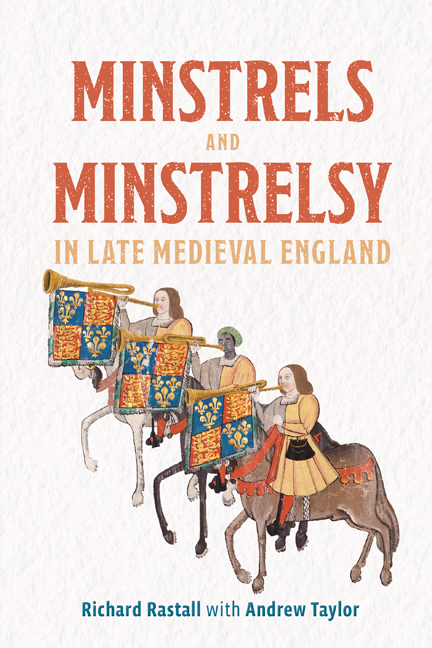Book contents
- Frontmatter
- Dedication
- Contents
- List of illustrations
- List of music examples
- List of abbreviations
- A note on references
- A note on money
- A note on dates
- Preface
- Acknowledgments
- Part I Minstrels and Minstrelsy in the Elite Households
- Part II Urban Minstrelsy
- Part III On the Road
- Part IV Minstrel Performance
- Envoi
- Bibliography
- Index
Part I - Minstrels and Minstrelsy in the Elite Households
Published online by Cambridge University Press: 09 January 2024
- Frontmatter
- Dedication
- Contents
- List of illustrations
- List of music examples
- List of abbreviations
- A note on references
- A note on money
- A note on dates
- Preface
- Acknowledgments
- Part I Minstrels and Minstrelsy in the Elite Households
- Part II Urban Minstrelsy
- Part III On the Road
- Part IV Minstrel Performance
- Envoi
- Bibliography
- Index
Summary
Introduction to Part I
These first five chapters consider minstrelsy in households, of which the king's was the most extensive as well as the best-documented. The principal sources of information about the king's household are the financial accounts of the Wardrobe and the Chamber. Not all of the records have survived, but even so there is an astonishing amount of material providing information on the day-to-day activities of household members, including the minstrels. These accounts contain the financial records of some special occasions, and the information these give is very important: but the accounts are also valuable in recording, in considerable quantity and detail, the kind of information that other sources do not – the wages, liveries, gifts, and reimbursements of expenses – and all in the context of often extensive and almost continuous travel as the court moved through the countryside. The information provided is basically objective: and although it is sometimes fragmentary, not easily interpreted, or inaccurate due to the errors of the accounting scribes, it is at least free of the deliberate hyperbole, allusion to symbolisms and other spin-related considerations that often make iconographic and literary sources problematic.
The records of dependent royal households – those of the queen, Prince of Wales and the king's younger sons – are equally detailed. Their survival is less extensive, however, and other secular households, even those of the great nobles, also yield much less documentation. Their recording systems were often robust, but unless the records were archived securely they could be lost or destroyed. Although there are some extensive survivals for short periods of time, most financial evidence consists at best only of a journal – the daily record of transactions – of an individual year or so. There are other types of record that can be useful, such as registers and household ordinances, and these help to build up a picture of life in a major household.
The domestic records of religious houses are likewise variable. At their best, they are the result of a meticulous accounting and archiving system, but in many cases water damage, accidental loss and deliberate destruction (especially at the dissolution of religious houses in the mid-sixteenth century) have ensured that little evidence remains of them. Unsurprisingly, the highest survival-rates are found in the archives of two cathedral priories that were refounded as secular cathedrals with minimum disruption of their lives: Durham and Worcester (although the latter's records are mainly of a later date than we consider here). For most houses, especially those that were dissolved in the 1530s, it is only by very good luck that any records have survived.
- Type
- Chapter
- Information
- Publisher: Boydell & BrewerPrint publication year: 2023

